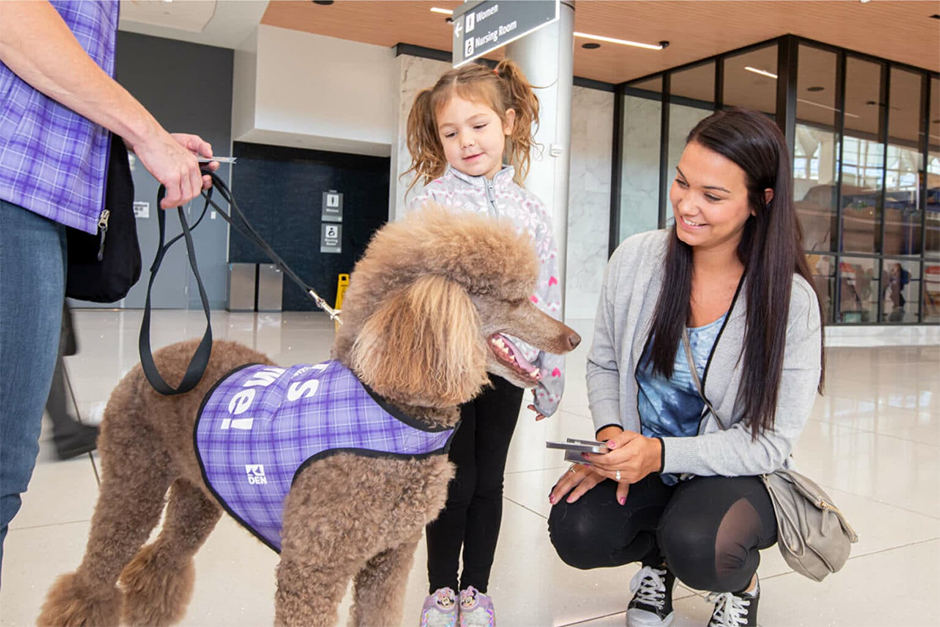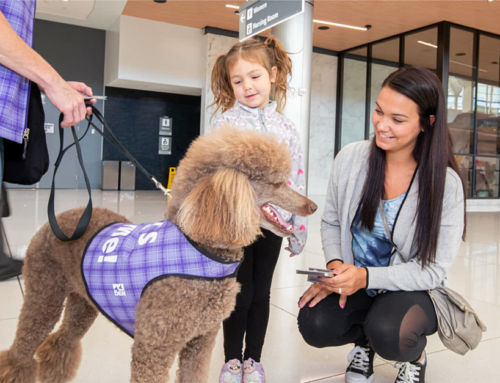
A service dog is a specially trained animal that assists individuals with disabilities by performing specific tasks related to their disability. Unlike emotional support animals, service dogs are trained to perform work or tasks that directly help with their handler’s disability, such as guiding a person who is visually impaired, alerting someone who is deaf, pulling a wheelchair, or providing support during a seizure.
Service Dog Access:
- Public transportation (buses, trains, airplanes)
- Restaurants and cafes
- Hospitals and medical facilities
- Stores and shopping malls
- Hotels and lodging
- Theaters and entertainment venues
- Workplaces (as a reasonable accommodation)
- Government buildings and offices
- Schools and universities
- Parks and recreational areas
- Housing, including no-pet housing
- Taxis and rideshare services
Key Points About Service Dogs:
- Legal Definition and Protections:
- Americans with Disabilities Act (ADA): The ADA defines a service dog as any dog that is individually trained to do work or perform tasks for a person with a disability. This includes physical, sensory, psychiatric, intellectual, or other mental disabilities. The ADA mandates that service dogs are allowed to accompany their handlers in most public places, including restaurants, stores, and public transportation, even if these establishments have “no pets” policies .
- Fair Housing Act (FHA): Service dogs are also protected under the FHA, which allows them to live with their handlers in housing with “no pets” policies. Landlords cannot charge extra fees for service dogs, although they can hold tenants accountable for any damages caused by the dog .
- Air Carrier Access Act (ACAA): Service dogs are permitted to travel in the cabin of airplanes with their handlers. Airlines cannot charge additional fees for service dogs, and the dogs must be accommodated according to the handler’s needs .
- Types of Service Dogs:
- Guide Dogs: Assist individuals who are visually impaired by leading them safely around obstacles.
- Hearing Dogs: Alert individuals who are deaf or hard of hearing to important sounds, such as alarms, doorbells, or crying babies.
- Mobility Assistance Dogs: Help individuals who have physical disabilities by performing tasks like opening doors, retrieving items, or assisting with balance.
- Medical Alert Dogs: Trained to detect and respond to medical conditions such as seizures or low blood sugar (diabetes).
- Psychiatric Service Dogs: Aid individuals with mental health disorders such as PTSD by performing tasks like interrupting self-harm behaviors or reminding them to take medications .
- Training and Certification:
- Service dogs require extensive training to perform their specific tasks reliably and safely. While there is no federal requirement for certification, the dog must be trained to meet the needs of the individual handler. Many service dog organizations provide this training, but individuals can also train their service dogs themselves.
- Businesses can only ask two questions to determine if a dog is a service dog: (1) Is the dog a service animal required because of a disability? (2) What work or task has the dog been trained to perform? They cannot request documentation or require the dog to demonstrate its tasks .
- State Laws:
- State laws vary in how they supplement federal protections. Some states have additional laws that protect service animals, such as prohibiting interference with a service dog or criminalizing the misrepresentation of a pet as a service animal .
Additional Resources:
- ADA Service Animals: In-depth federal guidelines on service animals.
- Service Dog Central: Resources for training, legal rights, and finding reputable service dog organizations.
- International Association of Assistance Dog Partners (IAADP): Information on service dog standards and partnerships.
Understanding the role and legal protections of service dogs is crucial for both handlers and the public to ensure these vital animals can perform their duties without unnecessary interference.

A service dog is a specially trained animal that assists individuals with disabilities by performing specific tasks related to their disability. Unlike emotional support animals, service dogs are trained to perform work or tasks that directly help with their handler’s disability, such as guiding a person who is visually impaired, alerting someone who is deaf, pulling a wheelchair, or providing support during a seizure.
Service Dog Access:
- Public transportation (buses, trains, airplanes)
- Restaurants and cafes
- Hospitals and medical facilities
- Stores and shopping malls
- Hotels and lodging
- Theaters and entertainment venues
- Workplaces (as a reasonable accommodation)
- Government buildings and offices
- Schools and universities
- Parks and recreational areas
- Housing, including no-pet housing
- Taxis and rideshare services
Key Points About Service Dogs:
- Legal Definition and Protections:
- Americans with Disabilities Act (ADA): The ADA defines a service dog as any dog that is individually trained to do work or perform tasks for a person with a disability. This includes physical, sensory, psychiatric, intellectual, or other mental disabilities. The ADA mandates that service dogs are allowed to accompany their handlers in most public places, including restaurants, stores, and public transportation, even if these establishments have “no pets” policies .
- Fair Housing Act (FHA): Service dogs are also protected under the FHA, which allows them to live with their handlers in housing with “no pets” policies. Landlords cannot charge extra fees for service dogs, although they can hold tenants accountable for any damages caused by the dog .
- Air Carrier Access Act (ACAA): Service dogs are permitted to travel in the cabin of airplanes with their handlers. Airlines cannot charge additional fees for service dogs, and the dogs must be accommodated according to the handler’s needs .
- Types of Service Dogs:
- Guide Dogs: Assist individuals who are visually impaired by leading them safely around obstacles.
- Hearing Dogs: Alert individuals who are deaf or hard of hearing to important sounds, such as alarms, doorbells, or crying babies.
- Mobility Assistance Dogs: Help individuals who have physical disabilities by performing tasks like opening doors, retrieving items, or assisting with balance.
- Medical Alert Dogs: Trained to detect and respond to medical conditions such as seizures or low blood sugar (diabetes).
- Psychiatric Service Dogs: Aid individuals with mental health disorders such as PTSD by performing tasks like interrupting self-harm behaviors or reminding them to take medications .
- Training and Certification:
- Service dogs require extensive training to perform their specific tasks reliably and safely. While there is no federal requirement for certification, the dog must be trained to meet the needs of the individual handler. Many service dog organizations provide this training, but individuals can also train their service dogs themselves.
- Businesses can only ask two questions to determine if a dog is a service dog: (1) Is the dog a service animal required because of a disability? (2) What work or task has the dog been trained to perform? They cannot request documentation or require the dog to demonstrate its tasks .
- State Laws:
- State laws vary in how they supplement federal protections. Some states have additional laws that protect service animals, such as prohibiting interference with a service dog or criminalizing the misrepresentation of a pet as a service animal .
Additional Resources:
- ADA Service Animals: In-depth federal guidelines on service animals.
- Service Dog Central: Resources for training, legal rights, and finding reputable service dog organizations.
- International Association of Assistance Dog Partners (IAADP): Information on service dog standards and partnerships.
Understanding the role and legal protections of service dogs is crucial for both handlers and the public to ensure these vital animals can perform their duties without unnecessary interference.






